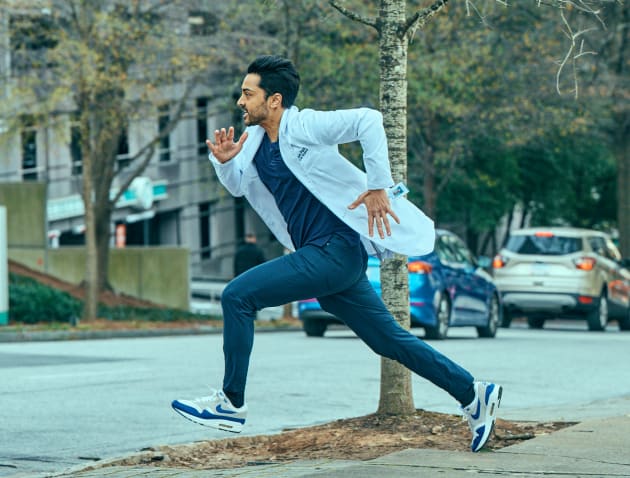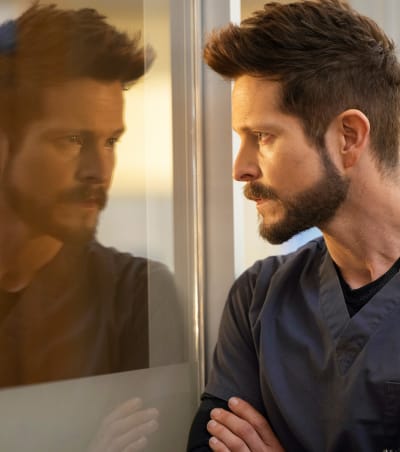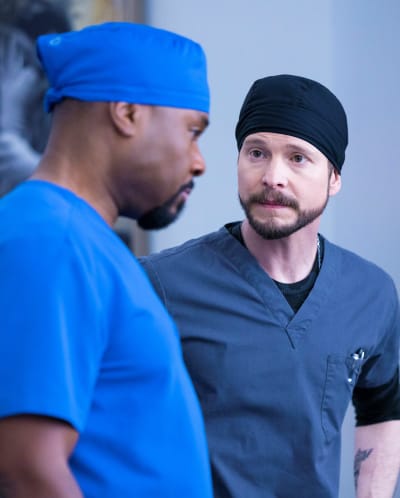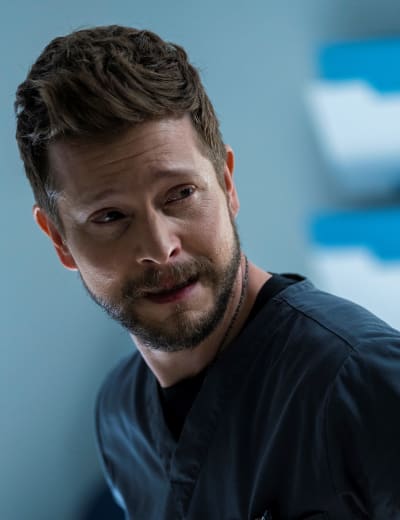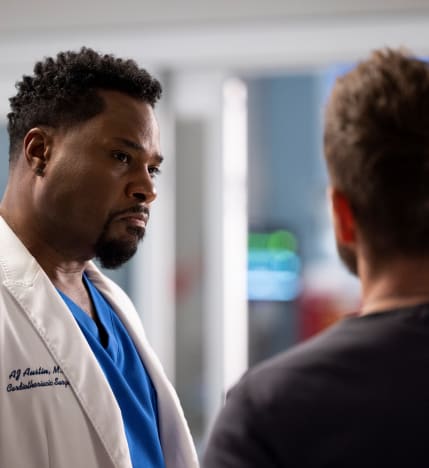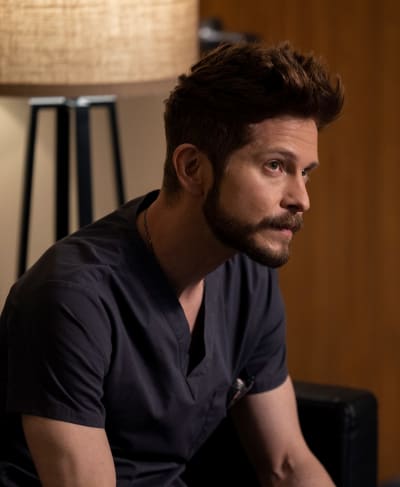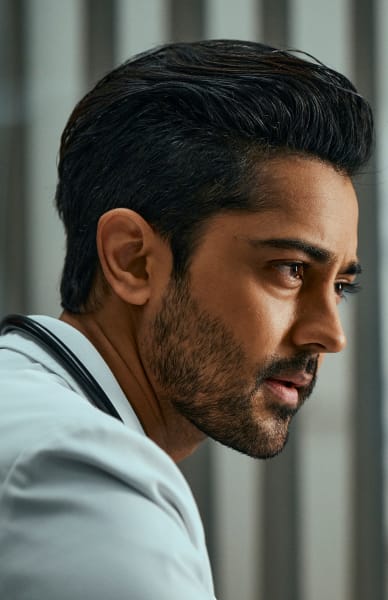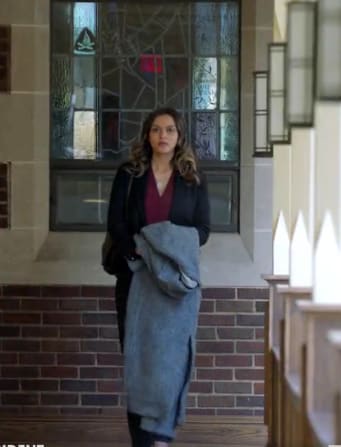One can comfortably state that The Resident has produced some of its finest installments during this season.
They’ve found a rhythm that works in many ways despite many changes that could’ve drastically impacted the series.
And, with hours like The Resident Season 5 Episode 16, we see a lovely balance between compelling cases and the personal tone that makes it feel as if we have more insight into these characters we’ve spent time with than ever before.
The Resident has settled into itself. While it was still enjoyable when they had Big Bads and massive crusades, the restrained approach of simply focusing on the flawed system on micro-levels feels more grounded and relatable.
Kit: You know, this whole moral crusader thing, looks good on you. It’s very superheroey.
Bell: You should see me in spandex.
It’s a way for the heroes to slay a thousand mini-dragons from where they are rather than one massive beast in a manner that, while exposing some disturbing truths about the field, are resolved in such unrealistic and unattainable ways that it renders viewers informed but facing a bleak reality.
But alas, we’ll move beyond waxing poetic and delve into the installment as a whole.
The time jump continues to be one of the strongest moves of the season, and there are installments like this when you see what that’s the case.
Nic is gone but not forgotten, and the depiction of grief -how non-linear it is, has been incredibly well done.
They don’t dwell on it or put Conrad in a perpetually bad place, incapable of moving forward with his life, but they find ways to honor that loss and relationship. They also go out of their way to showcase how it doesn’t matter how many years have passed; grief can still stop you short because this void will never go away.
AJ: Are you okay?
Conrad: Yeah, yeah, it’s just Nic has been on my mind and what we do. Just watching people slide into the veriage while we fight to save them.
AJ: Yeah, like we’re surrounded by loss, past, present, future, ours, other people’s. Look man, I’m preparing for my mother’s passing and when she does, I don’t know what I’m going to do. I know I’ll never know another like her.
Conrad: No, there are some holes you just can’t fill.
We didn’t need to see how Conrad sought out Pastor Aaron, any of their consultations, or their work to get a strong sense of that connection and how vital Pastor Aaron was to Conrad.
It was clear how vital Pastor Aaron has been in Conrad’s (and Gigi’s) life in helping them through their grieving period. The bond also gave us a deeper insight into Conrad without detracting from what was happening.
The severity of the medical case, the disturbing exposure of what happened to Aaron and many others, and a personal emotional arc checking back in on Conrad flowed together seamlessly.
The timing of checking back in with Conrad couldn’t have been better when we know that he has dalliances with a no-strings sex buddy and made this deep connection with Cade.
After those changes and others, it’s natural that the feelings that he’s not loyal to his late wife or the myriad of other emotions one experiences in those instances would rise to the surface.
We know he’s not doing anything wrong, and Nic would happily want him to move on, and deep down, he knows that as well, but it doesn’t make him miss her less or cling to the notion that if he does take those strides, he’ll somehow lose parts of her because there’s something comfortable about the grief.
It was lovely to see him talk through things with both Aaron and AJ. Conrad’s openness with his feelings and the raw honesty on top of the depiction of emotional maturity in having everyone talk about these things is genuinely refreshing.
Conrad’s connection to patients through his grief has also been moving to witness, and the subtle exploration of his spirituality after Nic’s loss has been great and realistic. It’s not lost that Conrad consulted a spiritual leader over a therapist, just like it wasn’t when he partook in a spiritual ceremony to honor Nic.
And because of AJ’s predicament, gearing for the impending loss of his mother, it’s made the ConRaptor dynamic much richer and more compelling than one could’ve dreamed.
The two of them commiserating over the unfillable void that the women they love will leave behind and how they carry around everyone and their own baggage, if you will, as doctors – it was one of the best moments.
And we got that and insight into the type of medical practices that exploit vulnerable communities and endanger lives for coins.
What happened to Pastor Aaron was so upsetting that, admittedly, this reviewer was shaking with frustration and anger. It’s maddening to know that this is far too prevalent and frequently in the most vulnerable communities.
Pellington: Any questions?
AJ: Yeah, just one. Did you go into medicine intending to become a fraud?
Pellington: Excuse me?
As AJ noted during his satisfying confrontation with Pellington, not only was the man greedy beyond moral comprehension, but he was piss poor at his skill, too.
Pellington flooded a community. He had Pastor Aaron trying to encourage his congregation, many of whom didn’t have health insurance or other such factors that contributed to them not having access to regular healthcare, to get cardiovascular screenings “for their health.”
He used all of these scare tactics on them, implying that they were at greater risk for things like heart attacks, then performed needless tests and medical procedures. He used Pastor Aaron like a damn guinea pig.
There are so many levels of how disturbing that was and the long history of medical mispractice waged against the poor, working-class, minority, and so forth communities.
Pellington ran a CATH that Aaron did not need and poorly placed an unnecessary stint in his heart. Aaron’s heart was fine when he saw Pellington, but he had long-term heart issues that may still cost him his life when he left.
Aaron benefited from having two great doctors who cared about him — but think of all the other people Pellington has done this to and how many of them were left with severe health issues or died.
It was close, but fortunately, pastor Aaron came out of it well, and we got that lovely scene of his congregation members and Hundley singing.
We also got another avenue of where the system is flawed with Bell’s struggles to advocate for Emily. His admission to the board is a win, but it’s also a battle.
If 100 good doctors do nothing about one bad one, we have 101 bad doctors.
Emily
He’s made it to this place where he can make a difference and evoke change, but we see how stagnant it is and how few people want to do what’s right.
I loved Bell finding his way around getting the board to listen to Emily about a doctor who very much sounded like Dr. Death.
He made some headway. Upon hearing Emily’s impassioned plea, which included that chill-inducing line about 100 doctors allowing one bad one to continue being bad, there are 101 bad doctors — a sentiment we’ve seen expressed in many ways and fields. They decided to look into it.
It makes you wary, as we don’t know if they gave lip service or if this will have blowback on Bell, who they expected to sit back and not do anything.
Bell’s ability to advocate for patients also feels like it comes from a newfound empathy because of his experiences. It was quintessential Bell to be stubborn and refuse to use a cane, but it’s precious how they got him into doing it anyway.
Devon’s case with Eliza was incredibly fascinating and compelling from start to finish.
It was nervewracking to watch her attempt suicide more than once, and Devon’s sprint to push her out of the way of a bus with his Clark Kent curl provided some pulse-pounding action.
Eliza’s case was utterly fascinating. She spoke about happiness as this abstract concept that she had never experienced a day in her life, and that’s something you simply do not see explored in the least.
The way they explored depression in this regard was compelling because it really emphasized its science in a manner that people mention but rarely display.
So often, with chronic depression, the focus is on the emotions themselves rather than the chemistry and neurology of it all.
It was refreshing to see Devon and Billie treating as they would other physical conditions first while working in conjunction with the psychiatrist.
Eliza had a profound grasp on her depression, revered even for her written work on the topic, so it was also nice to see her voice within it valued rather than anyone writing her off as a lost cause or focusing exclusively on suicidal tendencies.
It was important to see that she had a remarkable mind outside of this disease affecting her.
The DBS plan and the process of them getting here there felt like they took real time and care with this arc, and it was intriguing all the way through.
And the deep brain simulation turned out to be a success, which was a relief when, as a viewer, you couldn’t help but become thoroughly invested in this case and Eliza from start to finish.
It was no guarantee that it could ever work, and there is likely some controversy around the notion. But it was remarkable when, by 6 volts, she expressed that she experienced things she hadn’t before.
Thank you for not letting me go.
Eliza
A whole other world of emotions was unlocked for Eliza, and the actress was spectacular throughout but especially when she described what happiness was for her for the first time.
It was a provocative arc with great results, and it was also nice to see Devon and Billie working together and Billie in better spirits after her ordeal.
The gazebo conversation and scene between Jessica Lucas and Miles Fowler was beyond moving, and it was more beautiful work on display for both actors.
We’ve lost Trevor since he has this new job, although maybe he could pop up in other ways. Nevertheless, there was some excellent closure while simultaneously portraying how both of their worlds are now open to a new chapter in their lives where they are family.
Understandably, Trevor needed some time, and he was able to sort through his feelings before he sat Billie down to talk to her.
His revelation that he only got into medicine to prove his worthiness to the woman he felt abandoned him was quite powerful. Context is everything, and now that he has a true understanding of what happened, you can tell that he’s able to heal.
Trevor could be a great doctor, but he’s always been gifted in biochem, so taking a job on the right side of legal in a field where he’s talented and can thrive is the best thing for him.
And Billie’s admission that the time since the hearing is the closest she’s ever felt to maternal was powerful. Billie never saw herself as a mother with Trevor or even outside him. She never saw herself having children or pursuing that lifestyle.
I’m happy for you Trevor, and I’m very proud. I guess since Porter, since giving you away, it had been inconceivable to me that I could ever feel maternal towards anyone. I never wanted kids. But you forced me to meet you and what had been inconceivable happened, something opened up in me. You know, these past couple of weeks when I didn’t know where you were or what you were doing, I was beside myself with worry, which I suspect means I was feeling like a real mother. You are my son nothing can ever change that, and I love you.
Billie
But through all of this horror, she found sweet spots, genuinely loving, caring about, and wanting to protect this person who was an extension of her.
It’s such a complex situation and richly layered dynamic, but surprisingly, I say that they pulled it off beautifully because I had my doubts when they initially introduced this arc.
Their embrace was utterly heartwarming, and it coincides with the general feel of community, family, and unyielding support and love among all of these characters that have been more pronounced this season.
Over to you, Resident Fanatics. It’s plenty to discuss and dissect, so hit those comments and get into it!
You can watch The Resident online here via TV Fanatic.
Jasmine Blu is a senior staff writer for TV Fanatic. Follow her on Twitter.
